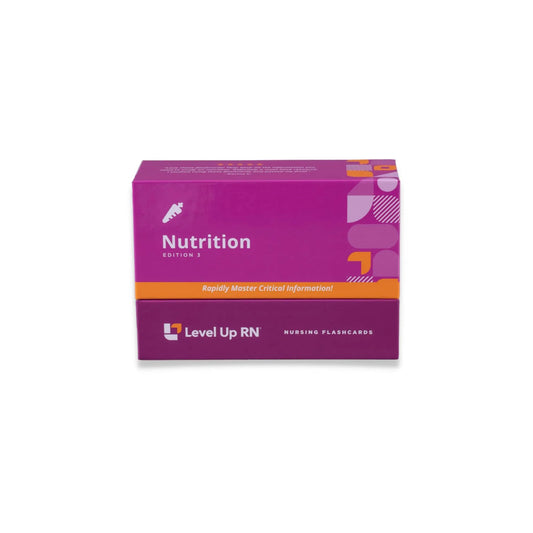Hi, I'm Cathy with Level Up RN. In this video, I will be discussing some key food medication interactions. And at the end of the video, I'm going to give you guys a quiz to test your understanding of some of the key points I'll be covering. So definitely stay tuned for that. And if you have our Level Up RN Nutrition Flashcards, go ahead and pull out your flashcards on food medication interactions so you can follow along with me.
First up, let's talk about tyramine. Tyramine is an amino acid found in foods such as bananas, avocados, aged cheese, pepperoni or salami, red wine, and chocolate. So a lot of those foods are kind of bougie foods or the finer things in life. If a patient is taking an MAOI, which is a class of medication used to treat depression, and they consume foods that are rich in tyramines, this can lead to a hypertensive crisis. So phenelzine is a key medication. That's an MAOI. And our cool chicken hint to help you remember this interaction is with phenelzine you can't enjoy life's finer things because they contain tyramines.
Next, we have grapefruit juice, which increases the risk for toxicity with many medications, including blood pressure medications, statins, and psychiatric medications, just to name a few. And many people mistakenly think that if they have grapefruit, it will just make their medication less effective. But that is not the case. It can actually increase the amount of medication in the body, leading to toxicity.
Next, let's talk about alcohol, which can cause excessive drowsiness when taken with a CNS depressant, such as an antihistamine, and can also increase the risk for hepatotoxicity when taken with certain medications, such as acetaminophen.
And then next, we have dairy products. Dairy products decrease absorption of iron supplements as well as certain antibiotics, such as tetracycline. So if your patient is taking an iron supplement or a tetracycline, they need to avoid taking those medications with milk, calcium, or antacids.
Next, let's talk about vitamin K, which plays an important role in coagulation. Warfarin, which is a blood thinner, works by inhibiting vitamin K. So our cool chicken hint to help you remember this is warfarin is going to war on vitamin K. So if a patient is taking warfarin, and they suddenly increase their intake of vitamin K-rich foods, then that is going to make warfarin less effective. Conversely, if the patient suddenly decreases their intake of vitamin K-rich foods, then that will place them at risk for bleeding. So when a patient is taking warfarin, they need to maintain a consistent intake of vitamin K.
Next, we have protein, which can decrease absorption of certain medications that require the same transport mechanism as amino acids. An example of this would be levodopa, which is a medication used to treat Parkinson's disease. And then lastly, we have potassium. Increased intake of potassium-rich foods can increase the risk of hyperkalemia when taken with certain medications, such as ACE inhibitors and potassium-sparing diuretics.
All right. It's quiz time, and I've got four questions for you.
Question number 1. Consuming foods rich in tyramines while taking an MAOI can cause a blank crisis.
The answer is hypertensive.
Question number 2. Do dairy products increase or decrease absorption of iron?
The answer is decrease.
Question number 3. How should a patient adjust their intake of vitamin K-rich foods when taking warfarin?
The answer is, they should maintain a consistent intake of vitamin K-rich foods.
Question number 4. A patient taking levodopa for Parkinson's disease should consume a low blank diet?
The answer is protein.
All right. That's it for this video. I hope it was helpful. Take care and good luck with studying.
[BLOOPERS]
Increase the risk of hepatotupaf-- when taken with medications such as sugwussashaga, hereberber.


